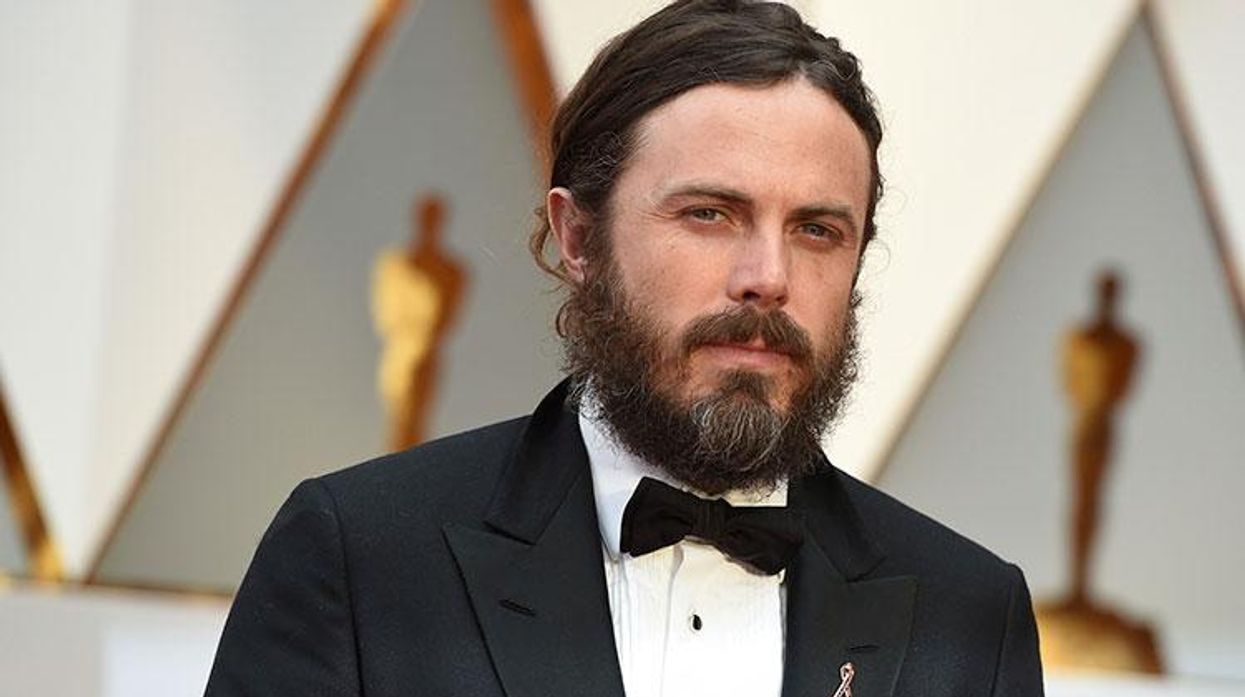A man who bragged about grabbing women without consent currently sits in the Oval Office, so it should come as no surprise that Hollywood's elite awarded an Oscar to and then delivered a standing ovation to Casey Affleck, a man who settled a pair of sexual harassments suits that claimed he engaged in deeply lewd behavior. But while the room stood and clapped as Affleck picked up his Best Actor Oscar for Manchester by the Sea, at least one fellow Oscar winner, Brie Larson, stood her ground for the women he'd allegedly victimized by refusing to clap for him. And the most awful, ironic part is that Larson, an advocate for survivors of sexual assault who won Best Actress last year for portraying a rape survivor in Room, was the person who had to read his name and present him with the award.
Stories of Affleck sexually harassing two women while he made his 2010 passion project I'm Still Here, a trippy documentary about his then brother-in-law Joaquin Phoenix, began to surface last fall. Some sites continued coverage throughout awards season, but the mainstream press and Affleck's colleagues in Hollywood either failed to pay attention or didn't care. One blip in the season, though, was that while Affleck picked up the Golden Globe award in January, a few weeks later, his colleagues who voted for the Screen Actors Guild awards chose to honor Denzel Washington for Fences.
Meanwhile, the women who filed suit against Affleck have been on the sidelines as he cruised through awards season, winning the Critics Choice Award and the BAFTA award (the British equivalent of the Oscars) in addition to the Golden Globe. He even landed a Variety cover edgily labeling him "The Outsider."
The women who filed suit, Amanda White and Magdalena Gorka, both worked on I'm Still Here, White as a producer and Gorka as director of photography. White alleged in her suit that Affleck engaged in several rude and lewd acts during the making of the film, including ordering a member of the crew to show White his penis even as she objected, referring to women as "cows," forcing her to listen to tales of his sexual prowess, and suggesting she become pregnant by one of the male crew members when he discovered her age, also implying she was becoming too old to get pregnant, according to The Daily Beast.
Gorka, who left the project but came back on board when White signed on as a producer, believing that having a female producer on the film would help quell any bad behavior, alleged that she awoke one night at an apartment where the crew was being put up to find Affleck, reeking of alcohol, sleeping beside her in a T-shirt and underwear, with his arm draped around her (Affleck admitted to having climbed into bed with her, according to the suit).
Upon returning to the set some months later, Gorka was faced with continual lewd behavior, according to the suit. She dealt with "a nearly daily barrage of sexual comments, innuendo, and unwelcome advances by crew members, within the presence and with the active encouragement of Affleck." Gorka left the production a second time and followed up with a lawsuit.
When Larson took her silent stand on the Oscars stage, refusing to applaud a man who waltzed through awards season unscathed by the scandal that should have ruined him, she sent a message to the women he reportedly harassed, that she stood in solidarity. Perhaps no better person could have been onstage to hand him that award. Once Larson took her stand, her role in Room as a survivor of repeated abuse and her advocacy work with survivors were brought to light. And then there was the unforgettable moment from last year's Oscars ceremony when Lady Gaga, herself a survivor of sexual assault, sang "Till it Happens to You" from the documentary The Hunting Ground, about campus rape. Gaga finished the song surrounded by real-life survivors, and as they exited the stage, Larson stood up and hugged every last one of them.
It's important that the real flesh-and-blood women who filed suit against Affleck are remembered and that they were never hiding. They put their names out there, and they did it for a reason, according to Gorka's suit.
"Plaintiff decided that her story needed to be told and that she is strong enough to withstand the attacks mounted by Affleck's high-paid publicists in New York and his 'bulldog' attorneys," Gorka's suit states. "Plaintiff decided to speak out in order to prevent this from happening to other young women who are simply trying to make a living in the entertainment industry and expect and deserve a non-hostile working environment."





































































Charlie Kirk DID say stoning gay people was the 'perfect law' — and these other heinous quotes